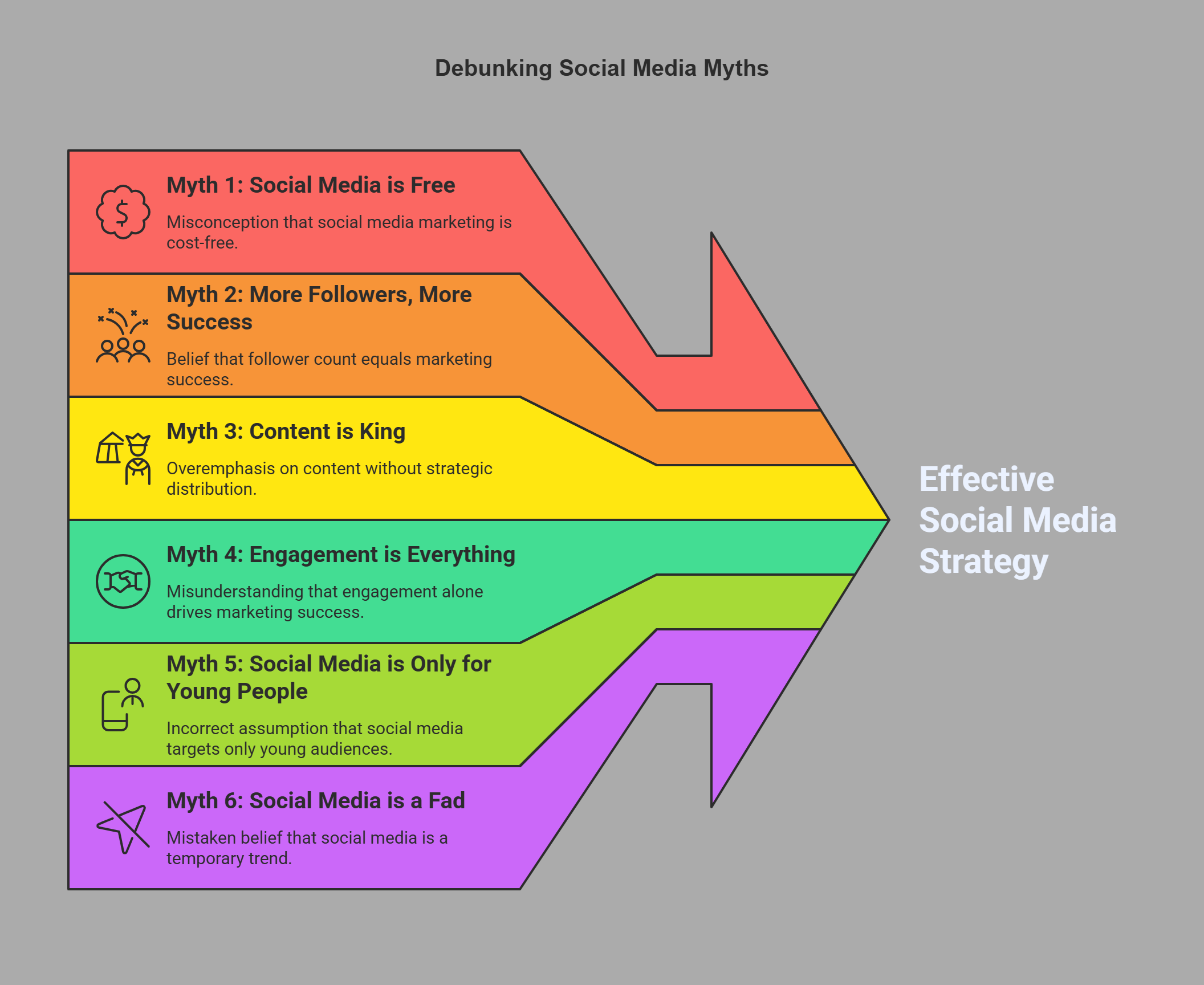I hope you enjoy reading this blog post.
If you want to get more traffic, Contact Us

Click Here - Free 30-Minute Strategy Session
Be quick! FREE spots are almost gone for this Month. Free Quote

Social media myths often distort the understanding of effective platforms, tools, and techniques, leading businesses astray. Misconceptions about algorithms, follower engagement, and posting frequency can result in wasted resources and missed opportunities. When these myths are internalised, they may shape strategies that fail to align with audience behaviour or marketing goals. Misunderstanding these dynamics makes it harder to evaluate the true impact of campaigns and tactics. Additionally, myths can discourage experimentation with innovative approaches, locking marketers into outdated practices. To distinguish fact from fiction, understanding common myths and their effects is critical to refining strategies for better outcomes.
While social media platforms are free to join, social media marketing often requires a financial investment. Successful strategies involve paid ads, boosting posts, or promoting content to reach a broader audience. Additionally, creating high-quality content—such as videos, graphics, or professional photography—can incur costs for production tools or outsourcing to experts.

Click Here – Free 30-Minute Strategy Session
Be quick! FREE spots are almost gone for this Month
Businesses must also factor in the value of time; crafting posts, interacting with followers, and analysing performance demand significant effort. Moreover, social media management tools and analytics software often come at a price. Effective marketing on social media is rarely cost-free, despite common misconceptions.
While frequent posting can keep a brand visible, quantity does not guarantee quality or engagement. Overloading social media feeds with posts risks alienating followers, especially if content lacks relevance or value.
Algorithms prioritise meaningful interactions, focusing on posts that encourage likes, comments, and shares rather than sheer volume. Spamming timelines with just promotional material can lead to reduced reach and lower follower activity.
Successful social media strategies balance consistency with thoughtful content creation. Brands should analyse audience behaviour and engagement patterns to determine optimal posting frequency. The emphasis should remain on crafting messages that resonate rather than flooding users’ feeds with excessive updates.
Believing that a brand must maintain a presence on every social media platform is a common misconception. Each platform caters to specific audiences and content types, making it critical for businesses to focus on the platforms most aligned with their target demographic and objectives. Spreading resources thinly across numerous networks often leads to diminished content quality and ineffective communication.
Companies benefit more from selecting platforms where their audience actively engages. For example:
A tailored strategy ensures greater impact, prioritising depth over breadth in engagement.
Social media platforms offer opportunities for businesses of all sizes, not just large corporations. Small and medium-sized enterprises (SMEs) can leverage these platforms to build strong customer relationships, increase brand visibility, and drive sales. By using targeted advertising options, even businesses with limited budgets can reach specific audiences effectively.
Social media also facilitates organic growth through consistent posting, engagement with followers, and leveraging trending hashtags. Smaller businesses can adopt a tailored approach that highlights their unique value propositions. From local businesses to online startups, social media provides an accessible way to connect with consumers and personalise marketing efforts without requiring vast resources.
While viral content may seem enticing, it is not a guaranteed formula for long-term social media success. Viral posts typically offer short-term engagement spikes but may fail to foster consistent audience interaction or loyalty. Instead of focusing solely on creating viral material, marketers should prioritise content that aligns with their brand values and resonates with their target audience.
A sustainable approach involves:
Consistency, relevance, and reliability often outweigh the fleeting impact of virality. This strategy leads to stable growth and a stronger online presence.
While a large follower count may enhance a brand’s credibility, it does not guarantee tangible results. Audience engagement plays a more significant role in driving success, as passive followers rarely contribute to conversions. Metrics like likes, shares, comments, and click-through rates provide deeper insight into a campaign’s effectiveness.
Focusing solely on follower growth can lead to superficial strategies, such as purchasing followers or neglecting content quality. Prioritising meaningful content that resonates with the target audience encourages interaction and builds trust.
Brands should use analytics to monitor engagement and conversion rates rather than obsess over follower counts, ensuring their efforts align with broader business objectives.
Many marketers assume paid ads yield immediate results, but this is rarely the case. While ads are designed to generate traffic rapidly, their effectiveness depends on multiple factors including audience targeting, creative design, and platform algorithms. A campaign often requires continuous optimisation to refine messaging and reach the right audience. Results may be slow initially as data collection helps improve performance over time. Success hinges on monitoring analytics and adjusting strategies rather than expecting instant ROI. Relying solely on paid ads without testing or understanding user behaviour can undermine the long-term efficacy of advertising efforts.
Identifying common social media marketing myths involves scrutinising trends, statements, and tactics critically. Marketers should analyse the source of information, prioritising credible industry reports and data. Myths often thrive when assumptions replace measurable outcomes.
Crafting a sustainable social media strategy requires a focus on evidence-based practices rather than outdated myths. This entails:
Social media success lies in dispelling misconceptions and fostering a well-rounded, informed approach. Implementing strategies based on accurate information ensures long-term growth while building genuine, meaningful connections in the digital landscape.

LEAVE A REPLY